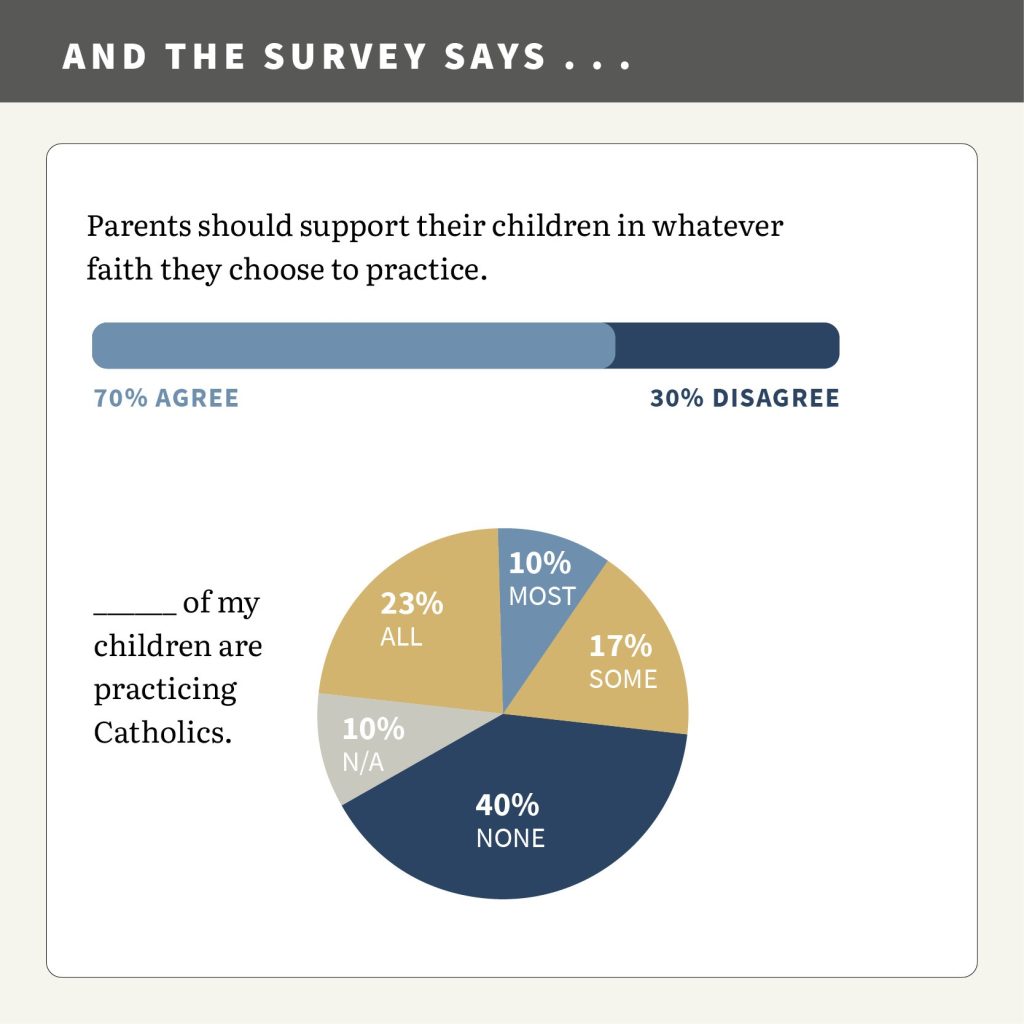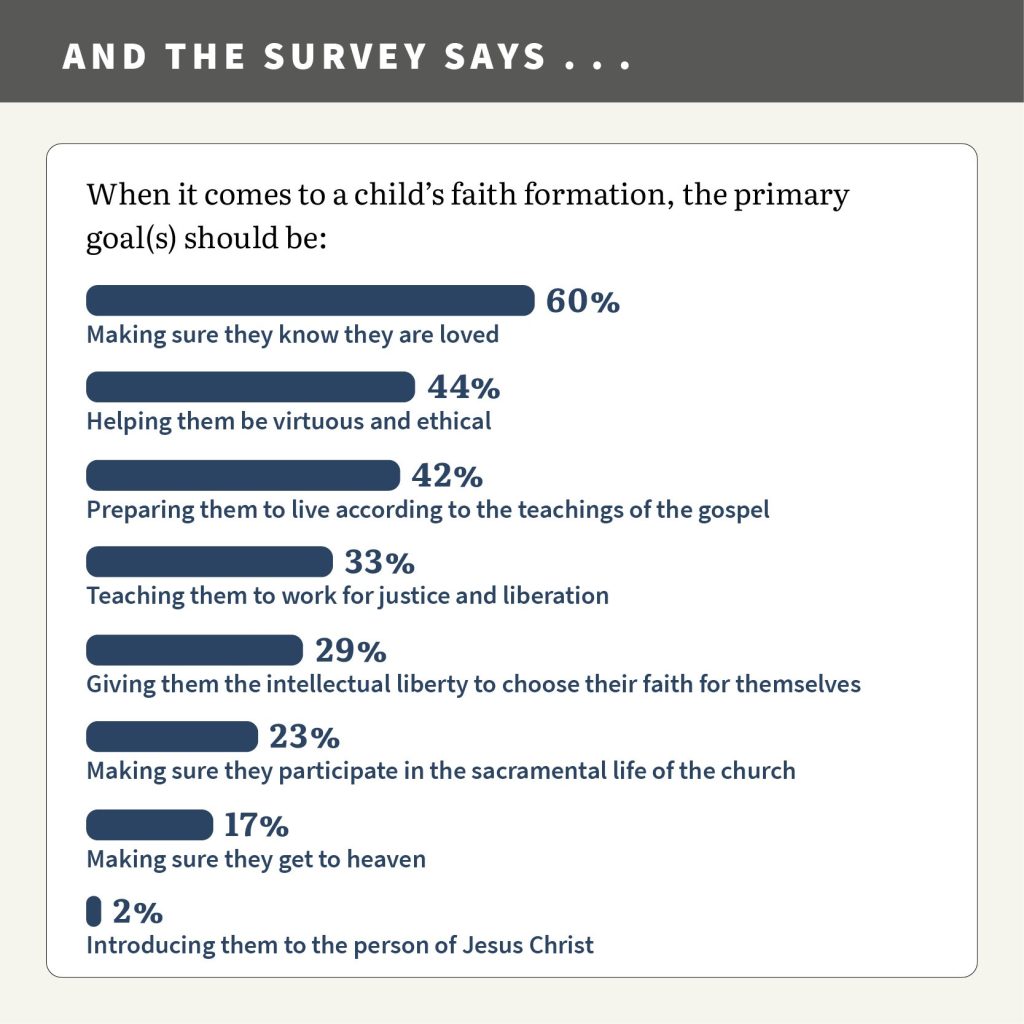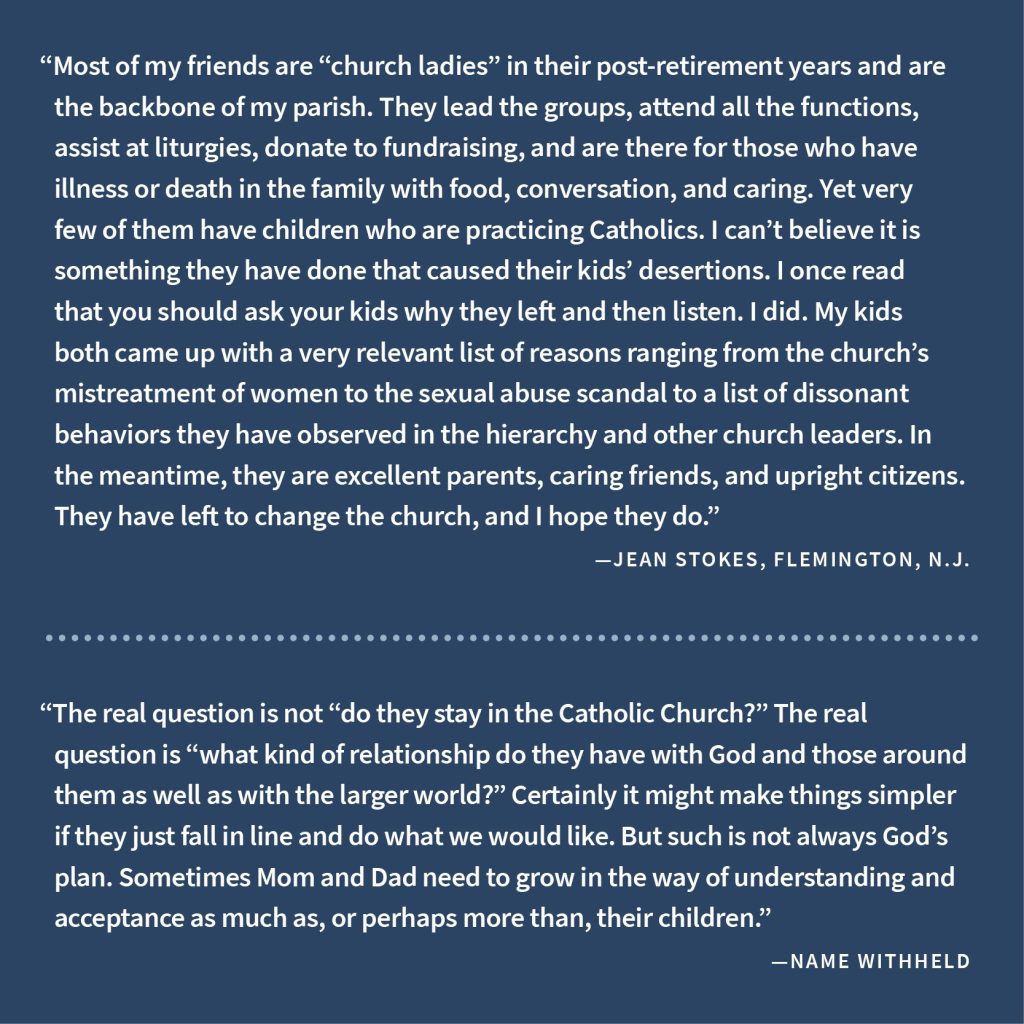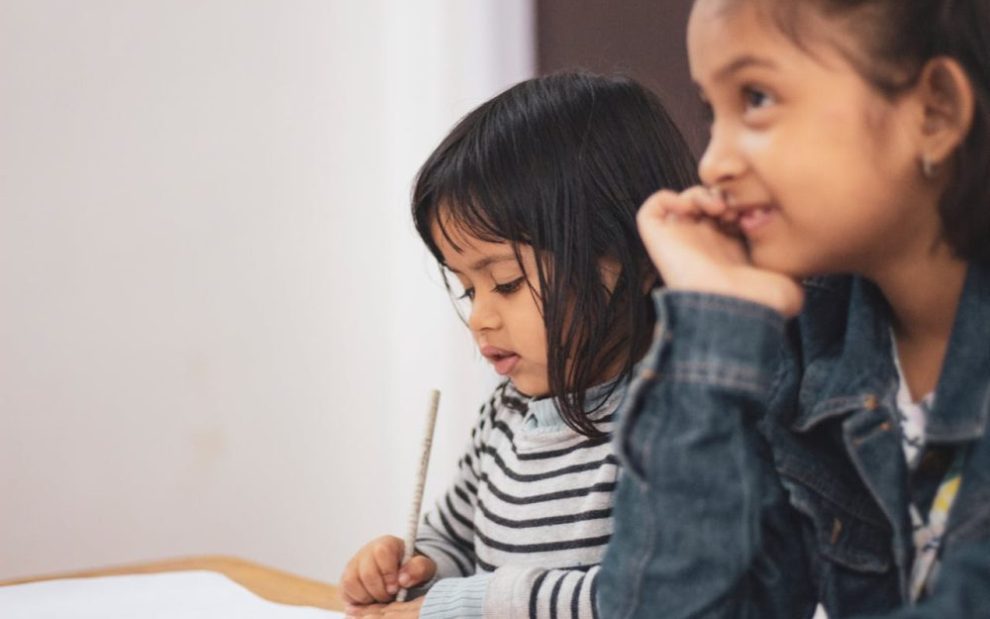Sounding Board is one person’s take on a many-sided subject and does not necessarily reflect the opinions of U.S. Catholic, its editors, or the Claretians.
As a Catholic parent, I have a checkered history when it comes to my children’s faith formation. There was the Easter my youngest insisted on wearing bright blue swim goggles for every photo and the time my oldest child declared, upon receiving his First Communion, that the host tasted of cardboard. My daughter belts out “Lamb of God” like a Broadway production, and our sacramentals include unconventional materials such as homemade candles, protest signs, crayons, and garden seeds. Despite the unusual approach, I hope that the sacred sneaks into our efforts.

I wasn’t raised with any organized religion, so I cannot say for sure what faith formation for children should look like. I became a Catholic as a young adult, thanks to the legacies of folks like Gustavo Gutierrez and Dorothy Day. Since having children of my own, I have stumbled my way through raising them with the ideas that shaped my own understandings of this inscrutable world. Like faith itself, parenting is a revolutionary choice that insists on stubborn hope and invites us to center wonder.
While I believe that children deserve agency at a young age, I see my role as a parent as crucial in creating the culture and traditions that inform their decisions. My older two children participated in First Communion rituals with excitement, but this year I am facing a child whose main reaction to this sacramental milestone is: “Do I have to?”
To be clear, there’s no judgment on his lack of enthusiasm. Some kids are more introverted or just occupied, at the tender age of 7, by more pressing concerns like what Pokémon cards to trade or the worms in the backyard. I did, however, start to consider how much I should let my children choose their religious practice as they grow and how to create a family culture that can instill the most crucial Catholic values while also respecting their agency.
My kids have been raised largely “in the church” as part of worshiping communities, which have shifted over the years based on my employment. All three children were baptized on a college campus and have participated in faith formation programs at multiple churches of two different denominations. They have attended Bible studies, pizza parties, marches for racial justice, Lenten fish fries, vigils for war and mass shootings, Earth Day Masses, and acts of solidarity with the LGBTQ+ community. We chalk our doorway at Epiphany, set shoes out for St. Nicholas, and feast on king cake at Mardi Gras. It is one gift of Catholicism that our faith comes with so much stuff—both material indicators of divine love and traditions that mark the passing of time. While children (and adults) might struggle to grasp the theology of baptism, they understand taking a bath to clean up. The theology of transubstantiation is mystifying, but family culture can teach how food can be an outpouring of love for others.
In a liberation theological model, immersion in the day-to-day lives of those most marginalized is always the first step. We start with the concrete reality, reflect on what is needed, then seek norms from social analysis, scripture, and tradition to inform our actions. The practice precedes the beliefs and informs our understanding of what our faith might offer to the world.
The same model can influence parenting for those hoping to raise children with some connection to their faith. First, we must find ways for little ones to participate meaningfully in Catholic traditions, which often involves play. One Christmas, my daughter’s main gift request was for a “Mass kit” to play church. I found something resembling a chalice, painted wooden hosts, and sewed stoles in liturgical colors. That Mass kit saw years of play, and when the COVID-19 pandemic shut down in-person Masses, we were ready to go with our well-practiced celebrant at home. Palm Sunday 2020 was one for the books, with palms of green construction paper and vibrant liturgical dancing in the living room.
But it’s not just playing Mass that invites children into the richness of our faith. Many Catholic traditions offer opportunities for interaction. The Advent wreath is traditionally a practice for use in the home, and eating dinner by candlelight once or twice a week during this season is a favorite in our house. We connect to the themes of waiting, preparation, and joy by moving our wooden donkey and Mary figures along a path of stars toward the stable. Making pancakes and king cake on Mardi Gras moves us to clear the kitchen—and our inner lives—of clutter for the Lenten season. And lining up photos of loved ones for an ofrenda on All Souls Day reconnects us to our entire family of faith, on Earth and beyond.
The Catechesis of the Good Shepherd (CGS), a Montessori-based model for faith formation, is one way to embody this approach of experiential participation for even the youngest children. Julie, a mom of three in Memphis, Tennessee, experienced this firsthand when her daughter discerned readiness for First Communion earlier than usual. At Julie’s parish CGS program, the children are encouraged to discern, and the teachers are always ready to empower the children’s choices when they are ready, not at a certain grade level. Because she had been constantly exposed to the practices of faith in a developmentally appropriate way, Julie’s daughter chose her own timing for both First Communion and reconciliation. For Julie, as a parent hoping to instill values of faith, this has been a gift to witness.

In a radically different example, Frida Berrigan, daughter of peace activists Philip Berrigan and Elizabeth McAlister, writes in It Runs in the Family (OR Books) about growing up with her parents’ gospel values, living in intentional community, scouring dumpsters for food, and often having one parent in prison for civil disobedience. The family lived in solidarity with the marginalized and continually reflected on the concrete by reading the gospels and taking action against the war machines of nations.
My suburban life may be very different from theirs, but I take inspiration from the Berrigans who, Frida Berrigan says, “saw themselves as part of the dynamic that is trying to change the world. With that belief—and lived experience—they endowed us with a moral cheerfulness that is both sustaining and infectious.”
I think this is the goal: to teach our children to love their neighbors, then step back and see what happens when they do it. My parish priest notes the difference between faith formation, which is ongoing and life long, and sacramental preparation. which focuses on doctrinal elements. I will probably not give my boys a choice about participating in First Communion and confirmation prep next year, but I am less concerned about their knowledge of dogma than about their encounter with the Holy Spirit and the community of faith,
Frida Berrigan also writes about her toddler: “Rather than trying to shape him in my image, why don’t I embrace his boundless wonder, his inexhaustible curiosity, and his hearty appetite for life? I must strive to be like him in some ways and also try to do what my parents did: provide tools, impart wisdom, love and protect the person, and let go of the rest.”
As she points out, children are their own wonderful, unique individuals, with their own agency. If we do our job as parents, we empower them to exercise that agency and hope they choose the path of love and justice once they fly the nest. We should worry less about doctrine and dogma and focus more on the work of being a Catholic. Then, we hope for the best. Even if they choose a different path, our work as parents remains to support their passion, be there for their mistakes, and encourage them to hold onto their values even as they explore new ones. Often, faith and tradition take hold in surprising ways and reemerge at unexpected times.
We don’t have to be saintly peace activists for our children to grasp the beauty of faith, hope, and love of neighbor. Our own family spends time protesting and standing vigil, but also celebrating the mundane and being part of a parish community. Like faith itself, parenting is an act of revolutionary boldness amid uncertainty. And at the end of the long days yet short years, I hope they still look at the world with wonder and a determination to disrupt oppressive systems, as Jesus did in the gospels. And if they still insist on costumes for Mass, that’s OK.

This article also appears in the September 2024 issue of U.S. Catholic (Vol. 89, No. 9, pages 31-35). Click here to subscribe to the magazine.
Image: Pexels/Pragyan Bezbaruah















Add comment